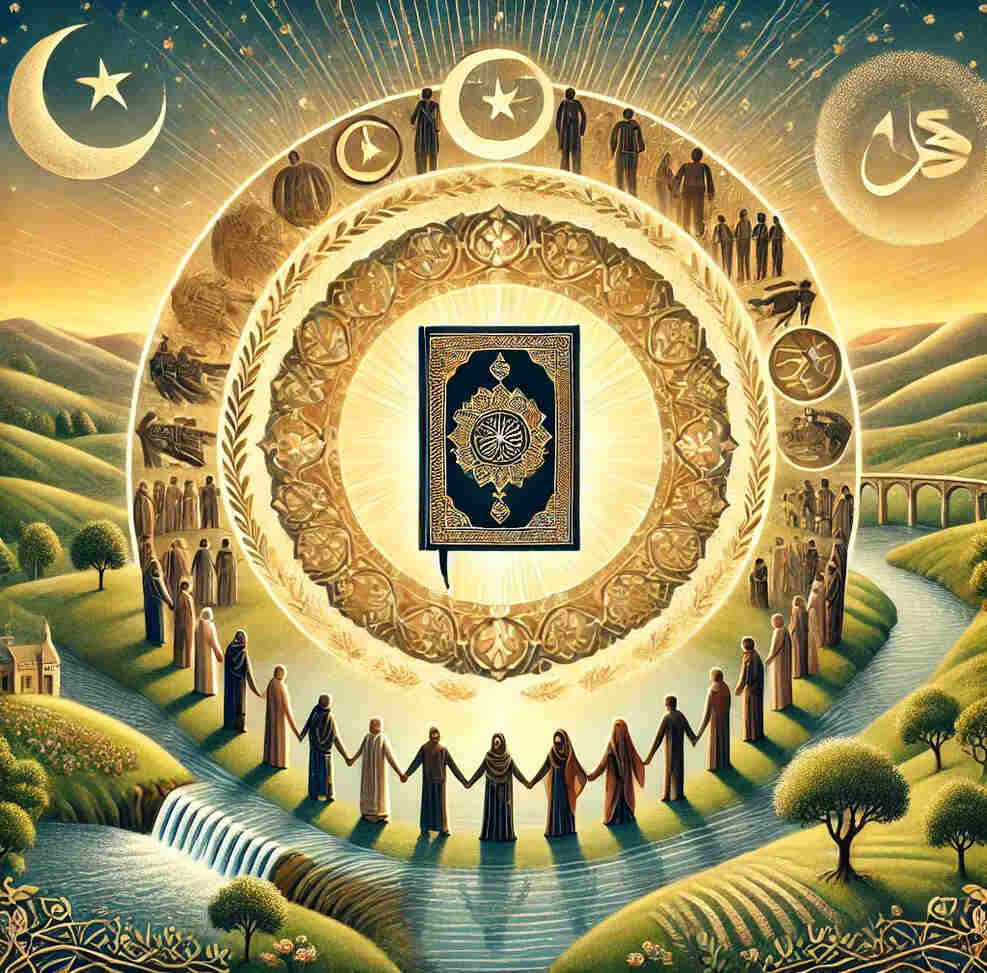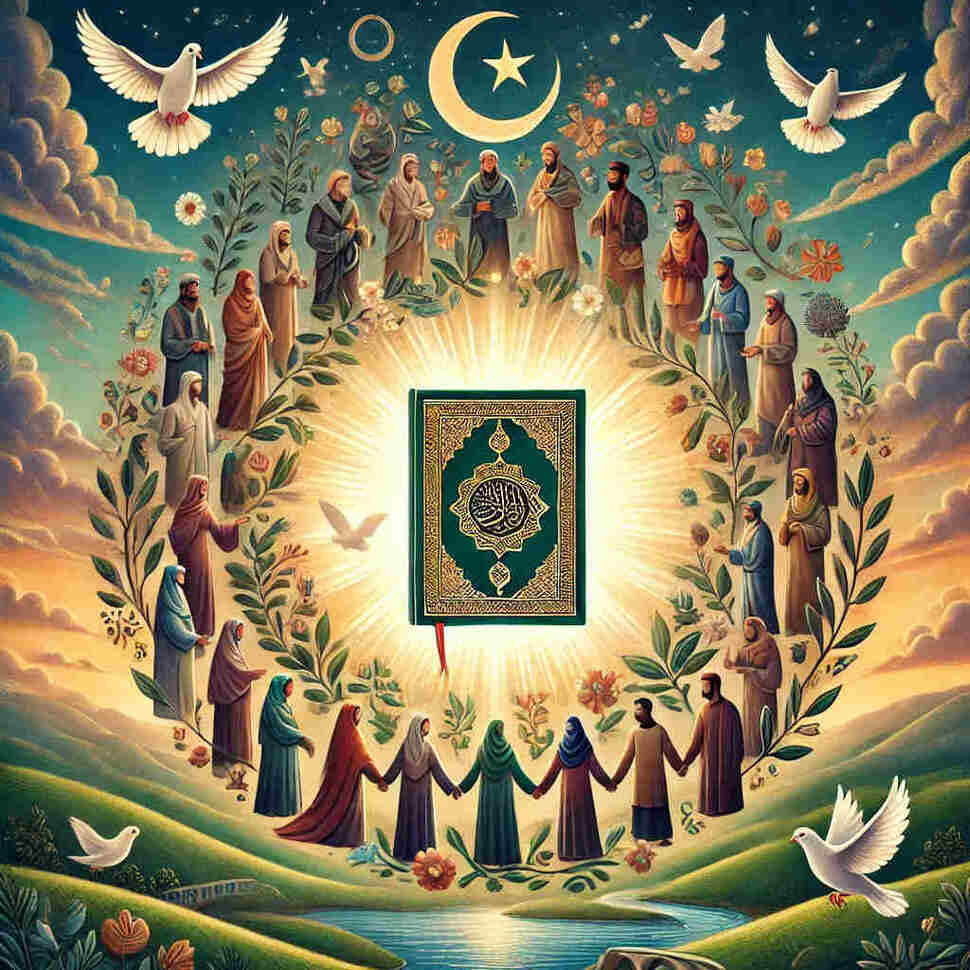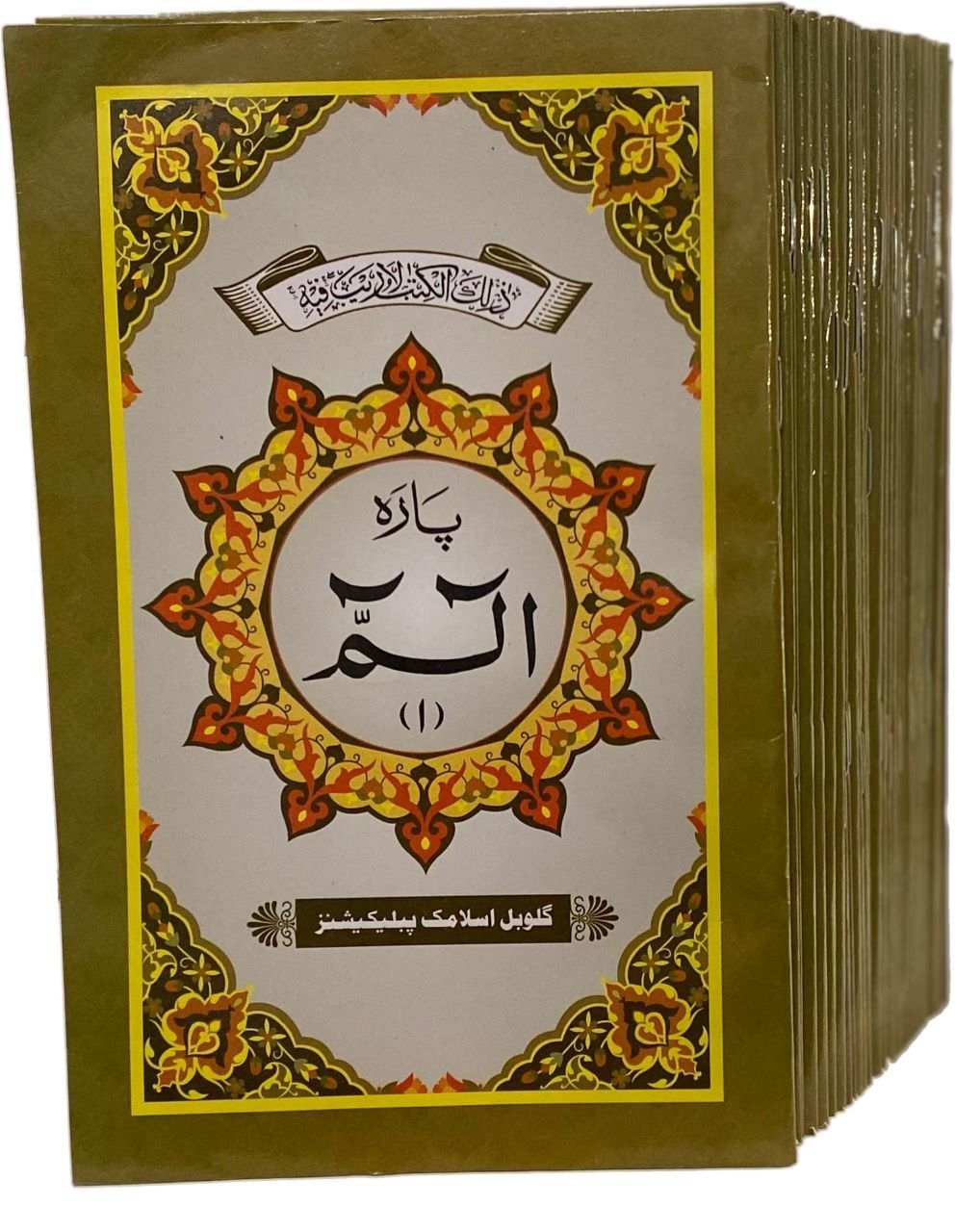
Quranic verses on peace highlight Islam’s emphasis on harmony, tolerance, and coexistence. These teachings guide individuals to foster justice, forgiveness, and compassion, creating a peaceful society. The Quran provides wisdom for resolving conflicts and promoting unity among diverse communities. Discover how its timeless messages inspire interfaith dialogue, mutual respect, and global harmony, showcasing Islam as a faith rooted in peace and understanding.
Introduction
Peace is central to the teachings of Islam, rooted in the Quran, which advocates for justice, compassion, and coexistence. The verses not only call for personal peace but also emphasize societal harmony. Below are key Quranic verses presented with their Arabic context and English translations to provide a deeper understanding.
Understanding the Essence of Quranic Verses on Peace
The Quran regards peace as a divine goal and a fundamental element of faith.
Arabic Context:
وَاللَّهُ يَدْعُو إِلَىٰ دَارِ ٱلسَّلَـٰمِ وَيَهْدِى مَن يَشَآءُ إِلَىٰ صِرَٰطٍ مُّسْتَقِيمٍ
Translation:
“And Allah invites to the Home of Peace and guides whom He wills to a straight path.” (Quran 10:25)
This verse underscores that ultimate peace stems from spiritual alignment with Allah’s guidance, emphasizing peace as a divine invitation.
Key Quranic Verses on Peace and Their Meanings
- Verse on Justice and Peace
Arabic Context:
إِنَّ ٱللَّهَ يَأْمُرُكُمْ أَن تُؤَدُّوا ٱلْأَمَـٰنَـٰتِ إِلَىٰٓ أَهْلِهَا وَإِذَا حَكَمْتُم بَيْنَ ٱلنَّاسِ أَن تَحْكُمُواْ بِٱلْعَدْلِ
Translation:
“Indeed, Allah commands you to render trusts to whom they are due and when you judge between people to judge with justice.” (Quran 4:58)
Justice is essential for peace, as fairness in dealings strengthens trust and resolves conflicts within communities.
- Verse Encouraging Forgiveness
Arabic Context:
ٱدْفَعْ بِٱلَّتِى هِىَ أَحْسَنُ فَإِذَا ٱلَّذِى بَيْنَكَ وَبَيْنَهُۥ عَدَٰوَةٌۭ كَأَنَّهُۥ وَلِىٌّ حَمِيمٌۭ
Translation:
“Repel evil by that which is better; and thereupon the one whom between you and him is enmity will become as though he was a devoted friend.” (Quran 41:34)
This verse emphasizes overcoming hostility with kindness and forgiveness, transforming adversarial relationships into friendships.
- Verse on Diversity and Coexistence
Arabic Context:
يَـٰٓأَيُّهَا ٱلنَّاسُ إِنَّا خَلَقْنَـٰكُم مِّن ذَكَرٍۢ وَأُنثَىٰ وَجَعَلْنَـٰكُمْ شُعُوبًۭا وَقَبَآئِلَ لِتَعَارَفُوٓاْ
Translation:
“O mankind, We have created you from a male and a female and made you peoples and tribes that you may know one another.” (Quran 49:13)
Acknowledging diversity as part of Allah’s design fosters understanding and peaceful coexistence among different communities.
- Verse Prohibiting Aggression
Arabic Context:
وَقَـٰتِلُواْ فِى سَبِيلِ ٱللَّهِ ٱلَّذِينَ يُقَـٰتِلُونَكُمْ وَلَا تَعْتَدُوٓاْ ۚ إِنَّ ٱللَّهَ لَا يُحِبُّ ٱلْمُعْتَدِينَ
Translation:
“Fight in the way of Allah those who fight you but do not transgress. Indeed, Allah does not like transgressors.” (Quran 2:190)
The Quran permits self-defense but strictly prohibits transgression, reflecting its preference for restraint and peace over conflict.

The Role of Tolerance and Forgiveness in Islam
Arabic Context (Tolerance):
لَكُمْ دِينُكُمْ وَلِىَ دِينِ
Translation:
“To you, your religion, and to me, mine.” (Quran 109:6)
This verse underscores Islam’s respect for religious diversity, promoting peaceful coexistence with people of other faiths.
Arabic Context (Forgiveness):
وَإِن تَعْفُوا۟ وَتَصْفَحُوا۟ وَتَغْفِرُوا۟ فَإِنَّ ٱللَّهَ غَفُورٌۭ رَّحِيمٌ
Translation:
“But if you pardon, overlook, and forgive, then indeed, Allah is Forgiving and Merciful.” (Quran 64:14)
Forgiveness is portrayed as a divine trait and a means to achieve inner and outer peace.
Promoting Universal Brotherhood Through Quranic Teachings
Arabic Context:
وَٱعْتَصِمُوا۟ بِحَبْلِ ٱللَّهِ جَمِيعًۭا وَلَا تَفَرَّقُوا۟
Translation:
“And hold firmly to the rope of Allah all together and do not become divided.” (Quran 3:103)
This verse calls for unity and solidarity, essential for establishing a peaceful and harmonious global society.

Conclusion
Through its verses, the Quran provides a comprehensive framework for peace, emphasizing justice, tolerance, and unity. These teachings are as relevant today as they were centuries ago, offering solutions to modern challenges of conflict and division. By understanding and implementing these principles, humanity can move closer to achieving lasting harmony.
 Colors
Colors 
 Support
Support 







